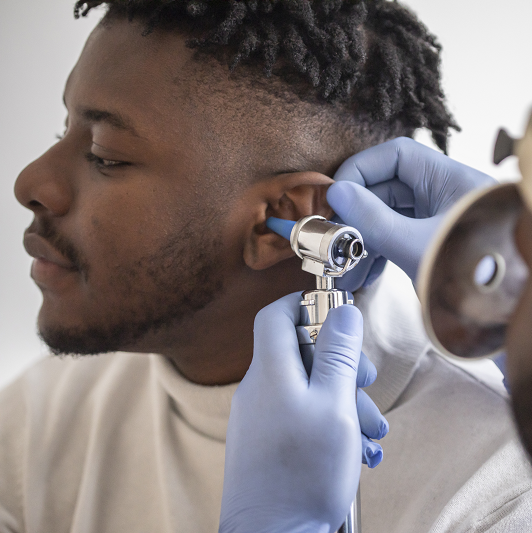How Loud is Too Loud?

September 06, 2022
Loud music is thrilling, but if other people can hear your music through your headphones, is it really a safe volume for your ears?
“Over time, excessive noise and volumes damage your hearing, and can result in hearing loss or sensitivity issues down the line,” says Betty Needleman, AuD, an audiologist at The Center for Audiology at JFK Johnson Rehabilitation Institute. “Noise-induced hearing loss is irreversible, so it is important to pay attention to your listening volumes, especially over long periods of time.”
There are some important signs to look out for when determining if your listening volume is too loud:
Check Your Volume
It may sound silly, but most of the time checking your volume is the best thing you can do to protect your ears. The World Health Organization (WHO) says that 85 decibels (db) is the highest level of exposure that is safe for a long period of time, specifically up to eight hours.
For decibel reference:
- 30db: a whisper
- 60db: a normal conversation
- 70db: hair dryer or vacuum cleaner
- 85db: school cafeteria or heavy traffic
- 100db: motorcycle or blender
- 145db: fireworks
- 180db: rocket launch
Most personal listening devices range from 75db to 136db, and therefore, a good way to check if your volume is safe is to ensure it is not over 60% of the volume. Many phones have features within their settings where you can set “volume limits” to ensure that your listening volumes never go over the recommended levels.
“A good rule of thumb is if you can’t hear anything happening around you, your volume is too high,” Needleman adds.
Give Your Ears Short Listening Breaks
Sporting events and venues have average sound levels ranging between 80db and 117db. Nightclubs, discotheques and bars have average sound levels around 104db to 112db. Most concerts can get even louder than this!
When going to such places it is recommended to take short breaks in a quieter area in order to break up the constant noise your ears are experiencing. If possible, moving away from the loudspeakers at these venues can exponentially decrease the negative impact on your ears.
“If you want to take the extra step in loud settings or if you have a job that requires you to be in noisy settings, noise canceling headphones or earplugs can help to lower the impact on your ears,” says Needleman.
Be Aware of the Signs of Hearing Loss
Things to look out for in daily life:
- Difficulty following conversations in noisy environments (restaurant, bar, etc.)
- Ringing or buzzing in your ears (or tinnitus)
- Difficulty understanding speech or making out words over the telephone
- Difficulty hearing high-pitched sounds such as alarms or doorbells
- Asking someone to repeat what they said constantly
Hearing loss signs & symptoms:
- Muffled speech
- Increased listening volumes when watching tv or listening to the radio
- Ringing, roaring, buzzing or hissing sounds in your ear
- Certain sounds bother you or create pain
Get Checked
To catch hearing loss before it is too late, get regular check-ups for your ears, especially if:
- You participate in noisy activities or hobbies
- You have a family history of hearing loss
- Your work environment is loud
- The medication you take makes you more susceptible to lose your hearing
Next Steps & Resources:
- To learn more about our hearing health services, visit our website.
- To make an appointment with a health care provider near you, call 800-822-8905 or visit our website.
- WHO Safe Listening Recommendations
The material provided through HealthU is intended to be used as general information only and should not replace the advice of your physician. Always consult your physician for individual care.
Find a doctor near me

Can Hearing Aids Make Hearing Worse?
Improve your hearing. Learn if hearing aids can worsen hearing loss. Find expert advice and resources to help you hear better.

Advice for Buying Hearing Aids
Get expert hearing aid advice. Avoid online risks; schedule a hearing assessment with an audiologist at JFK Johnson Rehabilitation Institute for personalized care and optimal hearing health.
Find a doctor near me

What Are the 3 Types of Hearing Loss?
Understand the 3 types of hearing loss. Learn about sensorineural, conductive, and mixed hearing loss from Dr. Gural-Toth. Schedule an appointment today.

5 Ways to Prevent Hearing Loss Caused by Headphones
While headphones can be incredibly convenient, they can also cause noise-induced hearing loss.

8 Reasons to See an ENT
8 Reasons to See an ENT Doctor. Dr. Mina Le explains ear, nose, and throat conditions like vertigo, tinnitus, and nosebleeds. Find relief. Call 800-822-8905.

Hearing Impairment and Masks: 8 Tips
Masking and social distancing during the COVID-19 pandemic has created significant communication challenges for people with hearing impairment.
